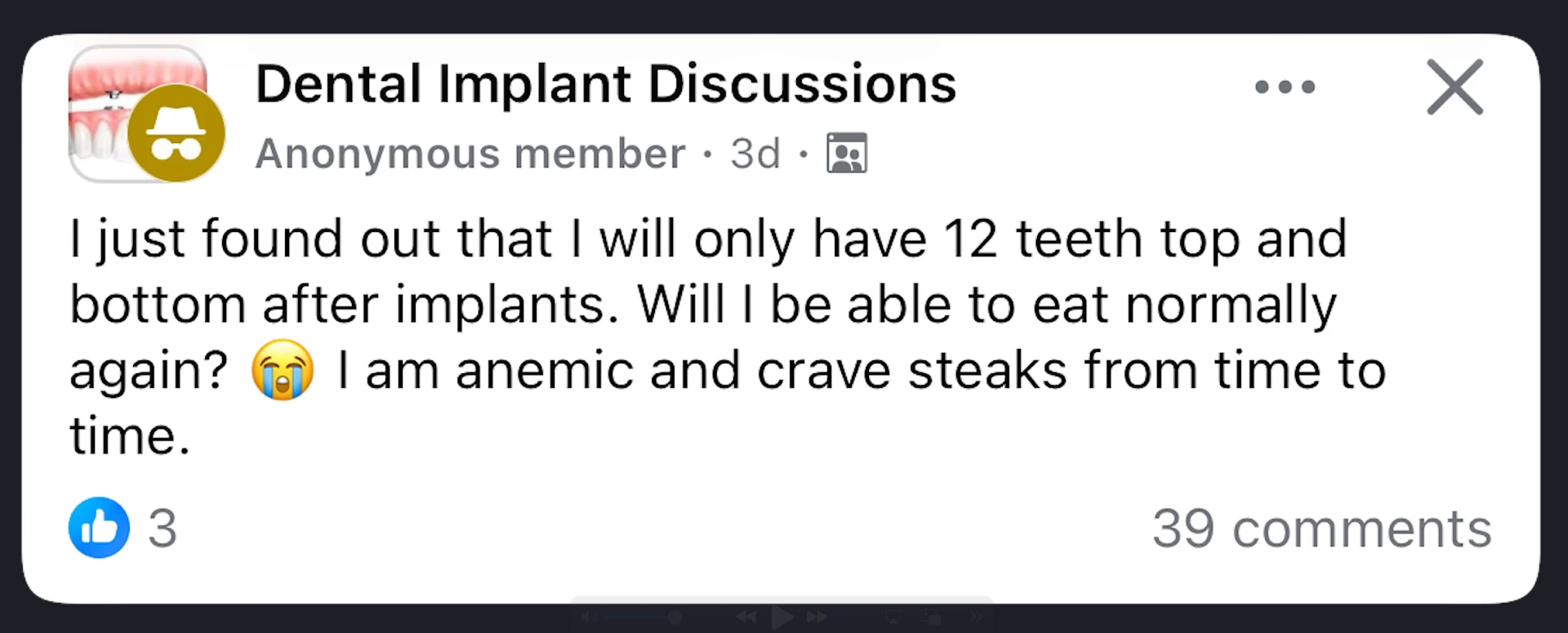Answering Common Dental Implant Questions From Real Patients
Getting dental implants is a big decision, and it’s natural to have a lot of questions. In the video above, Dr. Stott from Smile Now Dentures and Implants answers some of the most common concerns he finds from patients online. At Smile Now, we believe in empowering you with clear, expert information.
It can be difficult to find reliable answers in forums or social media groups. Our team is here to provide clarity on the implant process, from the first adjustment to your final smile. Let’s dive into two of the most frequent dental implant questions patients ask.
Question 1: “Why Do I Keep Biting My Cheek After Getting Dental Implants?”

This is an incredibly common—and painful—experience for new implant patients. Whether you have a single tooth implant or a whole new set of teeth, biting your cheek or lip can happen. As the patient in the video noted, this is often because the area is swollen. When you bite your cheek, it causes trauma, which leads to more swelling. This swelling then makes the tissue larger, getting in the way and making you more likely to bite it again. It’s a frustrating cycle.
The good news is that this is almost always fixable. You don’t have to live with it. The issue often comes down to the precise position or shape of your new teeth, and these are factors our dental team can adjust.
How Your Dentist Can Fix Cheek Biting
Our doctors have several ways to fine-tune your new smile to stop cheek biting and make you comfortable:
- Adjusting Tooth Position: The teeth can be slightly moved. This might mean adjusting them to be closer to the tongue or closer to the lips.
- Altering Tooth Height: Sometimes the teeth are too tall or too short, affecting how you open and close.
- Reshaping the Material: The way the teeth “jet out” can be modified to create more space for your cheeks and tongue.
The Smile Now Prototype Process
At Smile Now offices, we work to prevent this problem from the start by using a prototype. Before you receive your final, beautiful zirconia teeth, you will wear a “prototype” set. This prototype is made of a durable, plastic-type material and looks just like the final version. You will wear these for at least two weeks, but it can be longer if needed.
This “test drive” period is critical. It allows you to feel 100% comfortable and lets our team make any and all adjustments to prevent issues like cheek biting. We are committed to remaking teeth as necessary during this phase to ensure you get the exact smile you want before the final, more expensive teeth are fabricated.
Question 2: Answering Dental Implant Questions About Tooth Count and Chewing

Another one of the most common dental implant questions we see is about the number of teeth. A patient asked, “I just found out that I will only have 12 teeth top and bottom after implants. Will I be able to eat normally again? I am anemic and crave steak…”
This is a fantastic question, and the short answer is: Yes, you will be able to eat normally again. Let’s break down why.
Understanding Your New Tooth Count
An average adult has 32 teeth, but once the four wisdom teeth are removed (which is very common), most people function perfectly with 28 teeth. A full-arch implant solution with 12 teeth per arch (24 total) means you are missing the second molars. This is a very common design, especially for solutions built on four implants.
Will you miss those back teeth? Functionally, probably not. Studies have shown that even if you only have your first molars, you still have about 92-95% of the same chewing ability (or occlusal force) as someone with all 28 teeth. You will absolutely be able to enjoy that steak.
How Many Implants for a Full 14-Tooth Smile?
Psychologically, it’s completely understandable to want a full set of 14 teeth per arch (28 total). While 12 teeth are perfectly functional, 14 is also a reasonable request. However, this goal changes the treatment plan.
Often, a four-implant system does not have enough support in the very back of the jaw to safely support a 14-tooth bridge. Adding those extra teeth can create too much force (over-eating) on the back of the arch, which can compromise the implants.
- More Than Four: To safely support a full 28-tooth smile, a dentist will likely need to place more than four implants.
- Our Standard of Care: At Smile Now Dentures and Implants, our standard of care is six implants whenever possible. We believe in the “more than four” philosophy.
- Added Support: This may involve a fifth and sixth implant, or even specialized implants like pterygoid implants, to provide a stable foundation for those back molars.
Get Your Dental Implant Questions Answered by Experts
It’s hard to be a patient. There is so much information online, and as our doctor noted, a lot of it isn’t from experienced professionals who have placed thousands of implants. This is why we create content to help you understand the dynamics of implant dentistry and your tooth replacement options.
If you have your own dental implant questions, we would love to answer them. Our team is dedicated to helping you find the right solution, whether it’s a 12-tooth or 14-tooth solution, using our prototype process to get your smile perfect. Contact Smile Now for your free consultation today!


